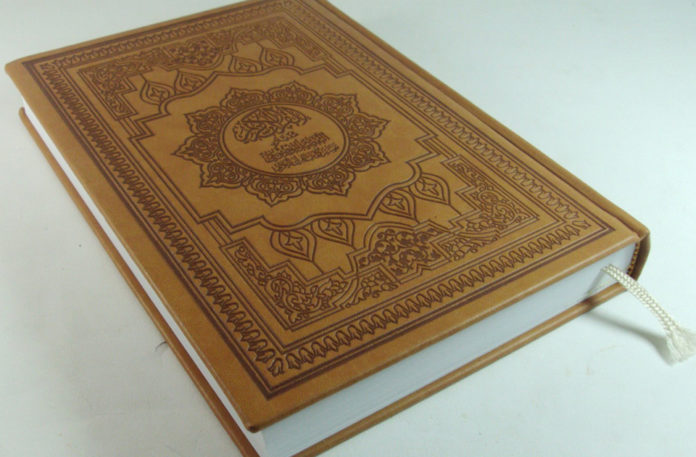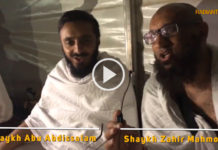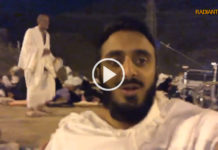All praise is due to Allâh Lord of all the worlds. May peace and blessings be upon the Messenger, his household and companions.
Fellow Muslims! Fear Allâh as He should be feared and be conscious of Him in private and public. Worship Him as if you see Him, and even though you do not see Him, He sees you.
And put your trust in All-mighty, the Most Merciful, Who sees you when you stand up (alone at night for prayers) and your movements among those who fall prostrate. Verily, He, only is the All hearer, the All knower.
Brethren in faith! There are lessons in the passage of days and nights, and the days move quickly like clouds. The people shall continue moving until they finally end in Paradise or Hell. Also, the speed by which days and nights move now confirms the meaning of closeness of times one to another which is one of the signs of the Hour as the Prophet has informed us. This is therefore, a great opportunity for the wise people to awaken, do good deeds and have sincere repentance.
Allâh says,
| It is He who has put the night and the day in succession for such who desires to remember or desires to show his gratitude. (Al Furqân 25:62). |
Muslims have recently spent a whole month enjoying the blessings of their Lord between supplications, prayers, and remembrance of Allâh, alms giving and recitation of the Qurân. But, alas, these days and their memories passed so quickly as if they were autumn leaves blown by a strong wind.
Dear Muslims! When one compares peoples situation in Ramadân and after it, one will certainly see signs of laziness and negligence in terms of doing righteous deeds as if acts of worship and repentance are only meant for Ramadân. These people are ignorant of the fact that Allâh is the Lord of all months and that Ramadân is only meant to be an occasion for renewal of ones resolve to worship Allâh and persevere in that.
That is why Allâh says after prescribing fast for His slaves,
| So that you may have piety. |
In view of this, it is incumbent on us to consider the realities of worship and its impacts and not its forms, for there are those who have nothing to show for their fasting except hunger and thirst and will have no reward for their worship save tiredness and night vigil. This is further confirmed when one hears people asking one another as to how many times they have recited the Qurân and listened to sermons and admonitions during Ramadân. Do not these people hear how Allâh dealt with Aad people who were very tall like lofty pillars, the like of which were not created in the land? Do they not read about what happened to Aad, Thamûd and the people of Prophet Lût? Do they not consider the Qurân carefully? Had it been from other than Allâh, they could surely have found therein much contradictions.
Where is the heart that is submissive to Allâh? Many hearts have become grassing grounds for heedlessness. The youth never desist from their exuberance and the elders do no do righteous deeds. We have neglected the Book of our Lord publicly and privately hence we are as far from pure deeds as Mount Safâ is from Marwa.
Allâh says,
| Do they not then think deeply in the Qurân, or are their hearts locked up (from understanding it)? Verily those who have turned back (have apostatized) as disbelievers after the guidance have been manifested to them, Satan has beautified for them (their false hopes) and (Allâh) prolong their term (age). (Muhammad 47:24-25). |
Brethren in faith! Do not be deluded by your determination to shun the dictates of your whims in Ramadân by yielding to temptations after it, for lustful desires have many intrigues. Remember that many a brave man have been dealt a deadly blow by those whom he underestimated. The person becomes negligent of his duties to Allâh after he has been doing them perfectly or fall back to sins after he has abstained from them is actually the farthest one from prosperity even if he deceive himself with seasonal acts of worship. He is also likely to be punished by being deprived of the joy and sweetness of worship. As for the believing men and women, whose private is as clean as their public and they do worship Allâh at all times, they will have the sweetness of worship and Allâh will provide them with their needs for they are the ones who sincerely follow the path of the Prophet in constancy in the acts of worship.
Brethren in Islâm! Ramadân is distinguished among other months as far as acts of worship are concerned, but this does not mean that acts of worship should only be performed in Ramadân.
The Messenger of Allâh was generous all his life and his generosity increased in Ramadân. He also used to seek refuge with Allâh from retreating from good deeds. He used to say,
| I seek refuge with You from recession after advancement. |
Allâh also discourages this situation when He says,
| And be not like her who undoes the tread which she has spun after it has become strong. (An-Nahl 16:92) |
The supplication that the Prophet used to make also confirmed this. He used to say,
| O Allâh! Make this life for me an increase in good deeds. |
He does not therefore restrict good deeds to Ramadân alone, but followed the commandment of his Lord that goes thus,
| And worship your Lord until there comes unto you the certainty (i.e. death). (Al-Hijr 15: 99). |
Brethrens in faith! Human beings are no doubt imperfect. The law of Islâm therefore, does burden them with what exceeds their capability. They are however required to hold fast at all times – unto the trustworthy handhold (the religion of Islâm) that will make them attain the pleasure or their Lord in this world and the next and which will save them from destruction and protect them against all evils however little their acts of worship may be.
The Messenger of Allâh said,
| O you people, do whatever you can of the righteous deeds, for Allâh will not cease to accept your deeds and bless you as long as you do not feel bored. The dearest of all good deeds to Allâh is the one done continuously even if it is little. (Al-Bukhâree and Muslim). |
In view of this, dear brothers, there are established acts of worship that should be done at all times and never change even after Ramadân like Salâh (prayer), Zakâh, invocation of Allâh and repentance, which Allâh enjoins on His slaves when He says,
| And all of you beg Allâh to forgive you all, O believers that you may be successful. (An-Noor 24: 31). |
The Messenger of Allâh used to say,
| I seek the forgiveness of my Lord and repent to Him 100 times a day. |
Since you have known this, dear brethren, it then becomes incumbent on you to put it into practice, for you have tasted the sweetness of worship and closeness to Allâh in Ramadân, do not therefore, spoil that with sins. Further, the continued observation of acts of worship or negligence in that goes back to the works of the heart, for it is the most changing part of the body.
That is why the Prophet said,
| Heart was given that name because of its inconstancy. The similitude of heart is like that of a feather at the bottom of three which wind blows hither and thither. (Ahmad). |
The Messenger of Allâh use to say in his supplication,
| O the One who change hearts, strengthen my heart on your religion. |
Brethren in faith! It is your right to celebrate the Eid for it is Allâh who made joy and happiness among the resultants of pleasure and certainty of faith and make sorrow and distress among the resultants of displeasure and doubt. Eid should be an occasion for clean recreation and amusement. It is when people exceed the limit of Allâh in their celebration and make it harmful to others that it becomes unlawful for in that case, people do not make a just estimate of Allâh such as is due to Him nor do thank Him for His blessings.
Al î bin Abî Tâlib saw some people playing around in a manner that is displeasing to Allâh on the day of Eid and said,
| If the fast of this people has been accepted of them, that is not how thankful people should behave and if their fast is not accepted that is not how afraid people should behave. |
Ibn Al-Qayyim said about happiness,
| Surely, Allâh shall bring this ware (happiness and joy) to its merchants (i.e those who know how best to rejoice) and those who know its value, though it may on the way fall on hands of those who do not know its value, for many is a carrier of knowledge who is not knowledgeable and many is a carrier of knowledge unto those who is better than him in understanding. |
Allâh says,
| The likeness of those who were entrusted with the (obligation of the) Torah (i.e. to obey its commandments and to practice its legal laws) but who subsequently failed in those obligation is as the likeness of a donkey who carries huge burden of books. (Al Jumuah 62:5). |
A Muslim, should therefore, not exceed the limits when rejoicing for Allâh does not love such a people because excessive joy generates arrogance and disdain for truth.
While commenting on the saying of Allâh,
| From the evil of the whisperer (devil who whispers evil in the hearts of men) who withdraws after one remembers Allâh) (An Nâs 114:4) |
One of the commentator said,
| The devil stays in the heart of men whenever he is happy or sad, when he remembers Allâh it withdraws. |
So fear Allâh during joyful moments for sincere Muslim does not exceed limit nor deviate from the truth when he is happy.
Alî ibn Abî Tâlib said,
| Each day in which man does not disobey his Lord is a celebration. |
Fellow Muslims! The Wise Law-Giver has prescribed for you the fasting of six days in the month of Shawâl.
The Messenger of Allâh said,
| Whoever fasts Ramadân and follows it up with six days fast in the month of Shawwâl is like the one who fasts for the whole year. |
It is better to observe this fast immediately after Eid and successively but there is no harm if one separates between them or fasts them anytime in the month but it is not obligatory. Whoever fasts it will be rewarded for that and whoever does not, will not be punished. If one is however consistent in fasting it for years and then becomes unable to do that in a particular year because of an illness or travel, he will get his reward completely as if he has fasted it.
The message of Allâh said,
| If a man is sick or travels, what he used to do while he was resident and healthy will be written down for him. |
However, it is not permissible for one to fast these six days before he makes up for the missed days of Ramadân for one will only get reward for six days fasting in Shawwâl if one has not completed the fasting of Ramadân.
Let whoever wants additional reward endeavour to fast on the 13th, 14th and 15th of every month for the Prophet has explained that whoever fasts them is like the one who fasts for eternity.
(NOTE: If you want to build a strong and powerful relationship with Allah, check out Islamia TV, where you can watch Islamic speakers from across the globe deliver inspiring and motivational courses. Learn more at www.islamia.tv.)





















